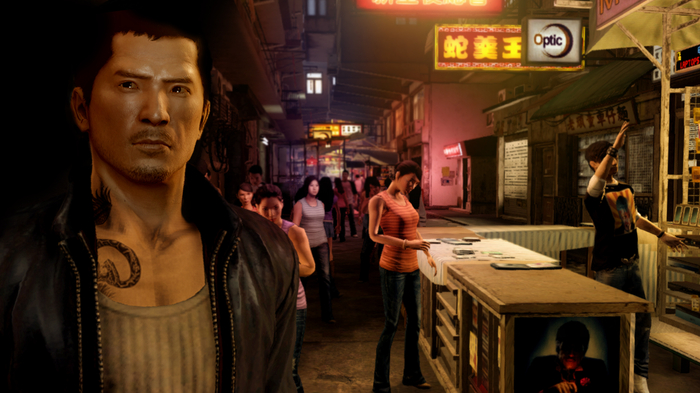“Sleeping Dogs” makes a noble effort to introduce some new elements to the sandbox genre, and some of them are quite successful, but in the end its unable to escape the clutches of familiarity that threaten to asphyxiate the entire genre. To their credit, United Front has shown incredible resolve in delivering such a good product after being thrown into the cold by the “True Crime” franchise. That this game is polished, well-balanced and engaging is a testament to their commitment. But a creeping sense of ennui still holds the game back.
On the surface, “Dogs” seems to offer an almost revolutionary experience by favoring hand-to-hand combat over gunplay. This is smart on two levels: firstly, it’s something no other sandbox game has tried; second, it keeps the player focused on the Hong Kong setting and makes it feel distinct. Ditto for little touches like driving on the left side of the road, which honestly take a few minutes for a Western gamer to adjust to. Speaking of the driving, the sense of speed is outstanding and the cars feel great, although the hand-brake system requires you to keep your foot planted on the gas for it to function properly, and this never quite felt intuitive to me. The normal brake is borderline useless, and the handy fish-tails like a Warthog, so there’s never really a go-to solution for effective turning.
Hong Kong is well-rendered by United Front, although I almost wished they had pushed the city’s unique flavor even harder to make it really stand out. As it is, the feeling of a new place is mixed about 50-50 with a shrugging sense of “oh yeah, another open world city.”
Other tweaks are more nuanced, but no less impressive. Clicking the left stick effortlessly cycles through your possible destinations, a simple little gameplay trick so breathtakingly helpful that it makes other sandbox games feel bereft for lacking it. The same is true for the free running system, where United Front had the inspired idea of making you tap the run button quickly right before a given obstacle in order to clear it. This simple little challenge hits the sweet spot and makes each foot-chase thrilling without being overbearing. For a long time, I’ve been trying to pinpoint why “Assassin’s Creed’s” parkour isn’t more exciting, and “Sleeping Dogs” just found the answer.
Okay, but now the problems. Going back to the hand-to-hand combat, they’ve aped the system here almost note for note from Rocksteady Games (but who isn’t doing that lately?) All well and good, but in the words of Omar Little, “come at the king, you best not miss,” and United Front missed. Hit detection is confusing, the counter system makes the entire bad guy glow red which feels ridiculous, and the grappling system vacillates between useless and overpowered. And since the moves set is kind of limited, it’s very hard to flow from enemy to enemy, which means each fight has a lot of clumsy stops and starts. It’s not a bad combat system by any means, it’s actually better than many on the market today, but it never settles in and really grooves.
Also, circling back to the original point of this essay, too much of this game is still painfully indebted to “Grand Theft Auto.” The cut-scenes are generally well-written but they’re so exactly lifted from Rocksteady’s work that I found it distracting. The basic architecture of the game is just way, way too close to what I’ve already done a dozen times. All sandbox games owe tribute to the master franchise, but the good ones find ways to keep you from lapsing into deja vu: “Saint’s Row” goes to ludicrous heights of excess, “Prototype” and “Infamous” completely overhaul movement and combat, etc. “Sleeping Dogs” tries to stake a new claim with hand-to-hand combat and a change of locale, and these touches are helpful, but the rest of the game is so insanely derivative that United Front can’t quite escape it. This is by far the most GTA-like game that’s not a GTA game ever made.
In closing, “Sleeping Dogs” is a well-implemented title, and it’s a minor miracle it got released at all. If sandbox games are your thing, you definitely need to play it, because it’s a virtuoso implementation of the form. But if you can take or leave an open-world urban crime saga, then pass on this one.
_AA
big things have small beginnings

